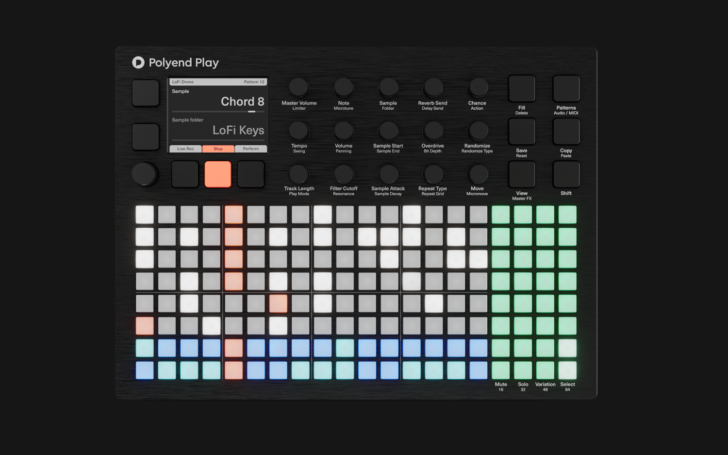Polyend has introduced Play, described as “the most fun sample- and MIDI-based groovebox ever”.
Play features 8 audio tracks and 8 polyphonic MIDI tracks, 30 kits to get started with, over 3,000 samples and a workflow that’s designed to be inspiring and simple.
Features:
- Compact standalone workstation, designed to have immediacy and simplicity at its core
- 8 audio tracks and 8 polyphonic MIDI tracks
- 30,000 track variations available, thanks to 128 Patterns holding 16 tracks, with up to 16 variations in each individual track.
- Track Length ranges from one to 64 steps, while each track can also benefit from different BPM-related Tempo, and even Swing values, as well as various types of playback.
- Control external synths and drum machines on individual tracks, with the ability to output a separate set of MIDI values per track.
- Flexible MIDI CC mapping per track for its individual rotary knobs, so users can connect an external controller for MIDI note input. It is possible to output chords, arpeggios, program and bank changes, pitch bend, clock, and more.
- 16×8 step sequencing grid
- Algorithmic or percentage-based probability
- Randomize
- Step Repeater (capable of making short stutters, pitch effects, volume fades, and more).
- Smart Fill tool
- Simple Select, Copy, and Paste controls make moving data — steps, tracks, track pages, variations — easy.
- Scale filtering to force Play to input and output only notes that fit the selected scale.
- Play’s Perform mode makes non-destructive changes to tracks via performance effects, including Filter Cutoff, Resonance, Microtune, Overdrive, and more.
- Master FX, including delay, limiter, reverb, saturator, and sound enhancer
- Live record automation (using the onscreen Live Rec button) or change individual step values on the fly
- Record monophonic or polyphonic MIDI data (using the Note knob, the View controller function, or an external controller).
- Customizable chaining of Patterns permit mapping out entire sequences anywhere on the grid for live performance,.
- Save and Reset patterns
Pricing and Availabilty
The Polyend Play is available to preorder, priced at of €799.00 EUR/$799.00 USD.


Polyend’s Play at least to me is one of the most unique and compelling musical tools in a long, long while. The sequencing workflow with all it’s variation possibilities is what I hope will at least be a personal game changer as I’ve already got my (pre) order in. Can’t wait to dive into this thing and find my flow with it.
Wow. If I didn’t already have a digitakt, I’d get this. Very cool little unit.
I think alot of people saw the teaser and waiting to see what this is before they purchased a tracker. Now, they will probably just purchase the tracker. Not going to complain about the price, seems like if it hits a threshold, thats all everyone complains about. But i will critique the lack of an audio in. Its like they wanted to make a sequencer and accidentally veered into sample player territory.
Can you record audio direct into it or do you have to just load samples in?
There is no audio-in. Unless you can sample over USB, I’d say you can only load samples. Makes the Deluge or MC-707 look like a better option.
How many audio outputs?
One!
What an interesting device! At first glance, it looks like shiny new refinement of interfaces and workflows that makers of electronic music have been using for decades paired with a relatively underpowered sound design engine. But it’s really all about the generative features under the hood. So it’s a device that actually may be a bit ahead of its time? Hard to say, and will depend on what musicians actually do with all of those algorithms and randomizers etc. IMO, it’s not really competing with the Deluge or MPCs or even the Elektron boxes. The Play is more like a next-level Novation Circuit (sans the digital synth, which I bet they end up adding in a future firmware update) — intuitive on the surface, about getting ideas documented quickly, but with unique sequencing tools that push it far beyond what the Circuits can do.
“The overall per-project sample pool memory allows for 6 minutes of monophonic 16-bit, 44.1 kHz sample files.”
“The maximum number of 255 sample files can be loaded to a single project.”
Unfortunately, 6 minutes mono 44k would be around 30MB, half of the elektron model:samples capacity.
No excuse for it when the Deluge can stream off the SD card directly giving you unlimited memory. Somehow one lone NZ developer has out-coded the development teams at Polyend and MPC.
I don’t know this looks kind of disappointing to me. a sequencer box with a bunch of premade stuff in it. am I missing something?
I hope this will sell well so they can work on Tracker 🙁
https://github.com/polyend/TrackerBetaTesting/issues
Looks kinda ugly lol. I like the display tho!
Seems bizarre and unnecessary that a company would deliberately hamper a new product for the sake of an older one. This should have an audio in and be able to sample. Collecting samples and deciding what goes on your SD card is to me at least a pain in the arse. Sampling something new and building a new track from scratch is where the fun is. In 2022 the Octatrack, despite its own limitations is still the best for this